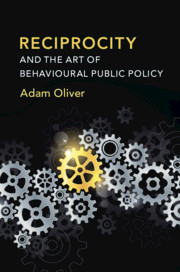Book contents
- Reciprocity and the Art of Behavioural Public Policy
- Reciprocity and the Art of Behavioural Public Policy
- Copyright page
- About the author
- Dedication
- Contents
- Figures and Tables
- Preface
- Acknowledgements
- 1 Setting the Scene
- 2 Animals and Infants
- 3 A Pinch of Anthropology
- 4 A Dash of Behavioural Economics
- 5 The Domain of Reciprocity
- 6 The Dark Side of Reciprocity
- 7 Nurturing Reciprocity in Public Policy
- 8 Reciprocity-Informed Policy Design
- 9 Towards a Political Economy of Behavioural Public Policy
- 10 Summing Up
- References
- Index
7 - Nurturing Reciprocity in Public Policy
Published online by Cambridge University Press: 06 July 2019
- Reciprocity and the Art of Behavioural Public Policy
- Reciprocity and the Art of Behavioural Public Policy
- Copyright page
- About the author
- Dedication
- Contents
- Figures and Tables
- Preface
- Acknowledgements
- 1 Setting the Scene
- 2 Animals and Infants
- 3 A Pinch of Anthropology
- 4 A Dash of Behavioural Economics
- 5 The Domain of Reciprocity
- 6 The Dark Side of Reciprocity
- 7 Nurturing Reciprocity in Public Policy
- 8 Reciprocity-Informed Policy Design
- 9 Towards a Political Economy of Behavioural Public Policy
- 10 Summing Up
- References
- Index
Summary
Reciprocity, if harnessed in the right way, can serve as a force for good, but it can wither and thus needs to be nourished. This chapter suggests three nutrients. First, reciprocity should be emphasised in the political discourse. If we want social structures that support the basic human motivation to reciprocate and hence cooperate, then how they do so ought to be explained clearly. Second, the decentralisation of more of the management of public services to local planners, purchasers and providers is advisable, partly because securing reciprocal motivations and actions and abating egoistical ones is more difficult the larger the group, partly because this would afford greater local level innovation, which, if good results were shown, could be disseminated cross-regionally, and partly because local level actors will be more in tune with the objectives and priorities of the people they serve. Third, there ought to be policy action on reducing the high concentrations of income and wealth within small percentages of the population, because if one wants people to give and take it makes sense to create conditions where they do not feel that others are merely taking.
- Type
- Chapter
- Information
- Reciprocity and the Art of Behavioural Public Policy , pp. 111 - 127Publisher: Cambridge University PressPrint publication year: 2019



